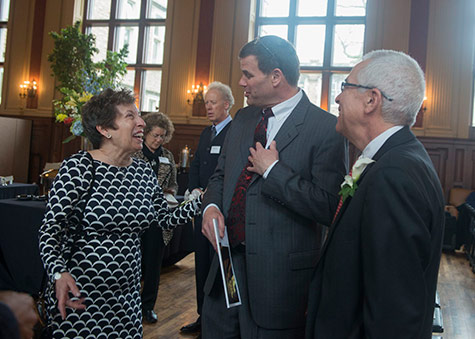
Anthropologist Tristram R. Kidder, PhD, was installed April 7 as the Edward S. and Tedi Macias Professor in Arts & Sciences during a ceremony in Holmes Lounge, Ridgley Hall.
“Professor Kidder has earned a reputation of excellence in the field of anthropology and archaeology, and has exhibited extraordinary leadership and teaching here at Washington University,” Chancellor Mark S. Wrighton said at the ceremony.
A professor in Arts & Sciences at Washington University in St. Louis since 2003, Kidder has served as chair of the Department of Anthropology since 2008. He will begin a second term as chair in July. He earned a bachelor’s degree from Tulane University and master’s and doctoral degrees in anthropology from Harvard University.
Before joining WUSTL, he taught for 13 years at Tulane, where he continued his research on early Native Americans in the Mississippi Valley.
His archaeological research over the past 15 years has focused on the evolution of human societies in the Southeastern United States, including the emergence of social ranking and development of domesticated food crops. His interest in geoarchaeology has led him to undertake studies of the evolution and chronology of the Holocene Mississippi River using archaeological data.
Another long-term interest is to explore the nature of social evolution in Native American societies with the goal of understanding the
circumstances that led to periods of greater or lesser social and political complexity.
The emergence and decline of mound building among Middle and Late Archaic cultures in Eastern North America is an example of the waxing and waning of seemingly complex behavior that Kidder is exploring in greater detail. Toward this end, he is working at several Middle to Late Archaic mound sites in the Lower Mississippi Valley, including the well-known Poverty Point site in northeast Louisiana.
He has applied archaeology and geology to the study of how human populations have adapted to climate and environmental change in China as well as in North America, focusing recently on the ancient dynamics of human settlements in the Yellow River valley of China.
His work at the Sanyangzhuang site, known as China’s Pompeii because of its excellent preservation, has led to a pathbreaking new understanding of how climate change and human manipulation of the environment shape human history.
“Professor Kidder’s research has contributed immensely to the world’s understanding of human diversity and the effects of climate change,
past and present,” said Barbara A. Schaal, PhD, dean of the Faculty of Arts & Sciences and the Mary-Dell Chilton Distinguished Professor.
“His work along the Mississippi River Valley has helped explain circumstances that led to social changes in ancient Native American societies. We’re fortunate to have someone of his caliber leading our
top-ranked anthropology department.”
Kidder is the inaugural recipient of a professorship recently established by the Board of Trustees using university funds to honor two
individuals who have played a vital role in WUSTL’s success for more than four decades: Ed and Tedi Macias.
About Ed and Tedi Macias
Ed Macias, PhD, came to WUSTL to teach chemistry in 1970, near the end of Thomas H. Eliot’s tenure as chancellor. Macias’ wife, Tedi, has been an active member in the campus community, including serving as co-chair of the Washington University Woman’s Club and in the creation and maintenance of the Elizabeth Gray Danforth Butterfly Garden.
Macias became a full professor in 1984 and, during the 1980s, his administrative roles included serving as chair of the Department of Chemistry and directing the Summer School program. He pursued seminal research, including a study demonstrating that the atmospheric haze obscuring the Grand Canyon was made up of pollutants from Los Angeles.
In 1988, Macias became university provost, a position he held for 25 years. In 1995, he accepted the position of executive vice chancellor
and dean of the Faculty of Arts & Sciences, along with a mandate to lead Arts & Sciences to the top rank nationwide. During this time, he also became the inaugural holder of the Barbara and David Thomas Distinguished Professorship in Arts & Sciences, a title he still holds.
He currently is co-chair of the Arts & Sciences Committee for Our Washington, the faculty and staff component of Leading Together: The Campaign for Washington University, which aims to raise the support needed to meet the university’s strategic needs.
“When it comes to the opportunities and challenges of the modern university, Ed has a deep, broad, and nuanced understanding,” Wrighton said. “He embraces change, solves problems and envisions the future with optimism and imagination.”